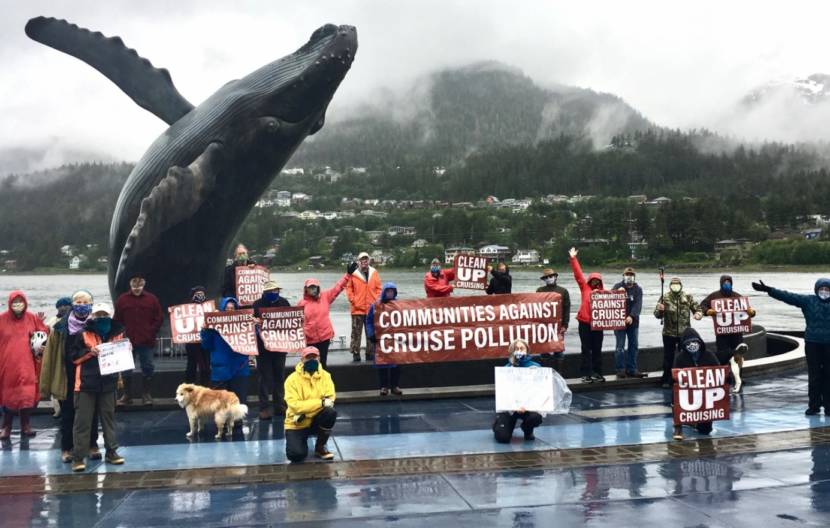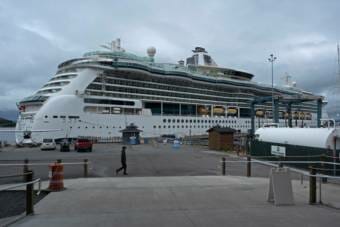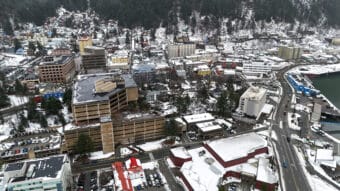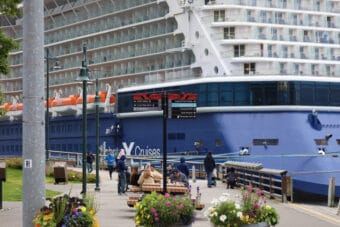
After a summer without cruise ships, many people in Southeast Alaska are desperate to see tourists return. But not everyone.
Some who were already frustrated with the industry’s rapid growth have added pandemic safety to their list of concerns, and they’re talking to people in other parts of the world who feel the same.
Karla Hart is a familiar face at public meetings in Juneau where tourism is on the agenda.
She’s testified repeatedly about negative impacts like noise, pollution and “leakage” — a term for money that doesn’t stay in the community.
It can be lonely. Even though there are people that agree with her, it’s hard to speak out against an industry that generates millions of dollars in local revenue each year.
“I mean, some people who live in Juneau have never experienced it in the summer without any cruise ships,” Hart said.
Recently, she shifted her focus out of state.
The inspiration hit her last year. She was working outside her house when yet another group of helicopters headed to the Mendenhall Glacier flew overhead.
“It popped into my head that we just need to get people from all over the world together, who are experiencing impacts of cruise tourism and start talking,” she said.
Hart went inside and sat down at the computer. She started by reaching out to someone she knew in Florida. That led to someone in another cruise port, and another, until they had a network of activists in dozens of countries around the world.
It’s called the Global Cruise Activist Network. The logo is two maritime signal flags. They represent “I want to communicate with you” and “stop your vessel immediately.”
Scrolling through a map on the network’s website takes you to places like Vancouver, Venice, Key West, Bar Harbor and Australia’s Gold Coast.
Her original idea was to bring people together for an in-person conference in Juneau this past fall. When the pandemic made it clear that wouldn’t happen, they shifted focus to putting pressure on the industry.
The network recently launched a “Rethink Cruise Tourism” campaign aimed at highlighting the risks of restarting cruising too quickly amid the pandemic.
In a video montage, network members around the world make an appeal directly to cruise passengers.
”Cruise ships have demonstrated that they simply aren’t safe during a pandemic,” a member standing in front of the Mendenhall Glacier says, followed by others who chime in with the reframe “rethink before you reinfect.”
Hart said members have diverse goals. A few want to see an end to cruising all together, but many of them just want to see the industry become more sustainable.
And that goes for Hart’s fellow activists in other Southeast communities too.
Over in Hoonah, Icy Strait Point drew about 260,000 passengers to the small community in 2019.
Even though the industry creates a lot of local jobs, Kashudoha Wanda Culp said the lack of local input outweighs the benefits.
“All we are is for display,” Culp said.
Like many people in Hoonah, Culp traces her heritage to nearby Glacier Bay. She’s concerned about the environmental effects cruise ships are having on her clan’s ancestral homeland.
Culp contends that the National Park Service wants to allow more ships into Glacier Bay. The current limit is two cruise ships per day.
Working with groups like Stand.earth and the Global Cruise Activist Network makes Culp feel hopeful that her concerns are reaching people outside of Hoonah.
Meanwhile, Hart and other concerned Juneauites are also holding community meetings to discuss what can be done at a local level to limit the growth. The next meeting will be held Thursday on Zoom.
“We could build a tourism industry in Juneau that consists of overnighting tourists, who come on an appropriate scale to our community, and who put more money into the economy per person in spending,” Hart said. “The money that they spend is money that will stay in the economy longer.”
Now is the time to make it happen, she said, before the ships return in full force.
Correction: A previous version of this story misstated the number of cruise ships allowed in Glacier Bay National Park on a daily basis. The limit is two ships per day.



